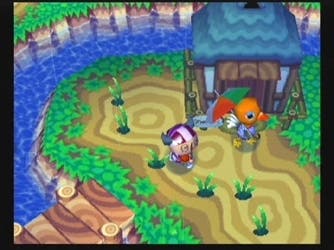Cult Classics: GameCube
Part 1: Animals, drums, war and tidying.
It's often tough to say goodbye. But when only eight games come out for a system in a whole year, it's probably time to bid our farewells. The last GameCube release - the last one ever, I think it's safe to say - was Ratatouille, and God knows where the shops put that. Hidden amongst the three pre-owned copies of Luigi's Mansion at the back of the shelf, probably.
It's a super little thing, though, the GameCube; oddly schizophrenic, it's a console that breaches the gap between the strict, inflexible, Yamauchi-led Nintendo of old and the friendly, progressive, casually successful Nintendo of today. And thanks to the Wii's backwards-compatibility (which, unlike either the PS3's or the 360's, is hardware-based, and works perfectly), its classics need not sit in the back of the cupboard like that enormous pile of Megadrive, N64 and SNES cartridges, ignored until you can be arsed to go through the tangle of old cables to find that peculiar N64 power supply.
It has a lot of fans, the Cube, and pioneered a few really interesting things like Game Boy Advance connectivity, the WaveBird and the Game Boy Player. You often see it painted as a poor, underachieving wee soul, but the reality was always far from that image. It was an experimental console despite its conservative business model, and even though it ended up about five million-odd sales behind its nearest competition and more than 90 million behind the market leader, it turned a good profit (the original Xbox, meanwhile, lost Microsoft around four billion dollars). It never challenged the PlayStation 2, eeither in terms of sales nor in the breadth and variety of its games, but it had an awful lot worth playing, including some of the best games ever made, and quite a few mad and brilliant titles that never made it over to Europe.
It's these that we celebrate here - the lesser-known Cube titles, many of which were impossible to find in shops even back when they were released; those that are interesting for one reason or another even if they were never blockbusters, those intriguing curiosities that you thought about buying in 2003 before balking at the price. These days, a good search of eBay should yield numerous obscure treasures for pennies. The good old Freeloader will still serve you well on the Wii.
Animal Crossing
- Developer: Nintendo
- Release: 2001 (2004 in Europe)
This, in hindsight, is definitely an historical artifact. Animal Crossing is the new Nintendo philosophy in its formative stages - inclusiveness, family-orientated play, accessibility, connectivity, all that jazz - and like Nintendogs, Brain Training and many of the other things that are currently making Nintendo rich, it was criticised for not actually being a game (and tormented reviewers). To people who don't like Animal Crossing, the hold it commands over its players seems like terrifying Nintendo voodoo.

Actually, though, Animal Crossing is all game. It's about incremental improvement, input and reward, and the accumulation of vast, vast numbers of things - all classic, traditional gaming values. It has a vast amount of content, but its genius is that it never overwhelms. Instead it keeps you playing for literally years with its steady drip of new, exciting items and developments in your own little town and its charmingly bonkers characters. I'll never forget sneaking away from my own family celebrations on the Christmas of 2001 to share a celebration at the town fountain with my virtual neighbours. Dolly the sheep gave me a green scarf.
The astounding thing about Animal Crossing is its endurance, really, as a concept. First released in 1999 on the N64, then again on the GameCube in 2001 (and again in 2004 in Europe, after three ridiculous years), then yet again on the DS, and due for release again on the Wii, it's gone from a great idea marred by cumbersome technology - like trading memory cards to visit other towns, hooking up your Game Boy Advance to download NES games and designs and scanning GBA E-Cards for new stuff - to something hugely successful and universally appealing, just as it was originally intended to be. To track the history of Miyamoto's very first 'communication game' is to track many of the developments that have changed Nintendo and its audience over the past decade, and it's a very interesting exercise.
What we said: "It's charming and childish, yet has that layer of humour sophistication that rescues it from being labelled as a mere curiosity cult."








